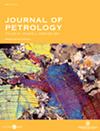Bulk compositional influence on diverse metapelitic mineral assemblages in the Whetstone Lake area, Ontario
IF 3.5
2区 地球科学
Q1 GEOCHEMISTRY & GEOPHYSICS
引用次数: 0
Abstract
Abstract Understanding the interplay between bulk composition and metamorphic grade underpins our interpretations of metamorphism in orogenic belts. The focus of this study is the regional garnet-staurolite-kyanite-sillimanite metamorphic sequence of the Whetstone Lake area, southeastern Ontario. In the kyanite and lower sillimanite zones of this area, there is exceptional diversity in metapelitic mineral assemblages that cannot be accounted for by differences in metamorphic grade. We present a dataset of petrographic observations, phase proportions, whole-rock geochemical compositions, and mineral compositions, from thirty-two samples which encapsulate the range of assemblages found in these zones. Wide, as well as quite subtle, differences in bulk composition are the primary control on mineral assemblage development. Whole-rock XMg = molar MgO/(MgO+FeO) and ${\mathrm{X}}_{\mathrm{Fe}3+}=\mathrm{molar}\ 2\times {\mathrm{Fe}}_2{\mathrm{O}}_3/\left(2\times {\mathrm{Fe}}_2{\mathrm{O}}_3+\mathrm{FeO}\right)$ exert the greatest control on the observed mineral assemblages, whilst MnO, K2O, and Al2O3 have a secondary influence. We use a set of quality factors (Duesterhoeft and Lanari, 2020) to test the ability of thermodynamic models to reproduce the observed mineral assemblages, modal abundances, and mineral compositions in the diverse bulk compositions at Whetstone Lake. Eight samples were selected for phase equilibrium modelling, for which two bulk compositions were calculated for each sample: (1) a whole-rock bulk composition based on an X-ray fluorescence analysis and (2) a carefully considered local bulk composition based on combining mineral proportions with representative mineral compositions, as obtained from a single thin section. Our modelling uses thermodynamic dataset 6.2 (Holland and Powell, 2011) and the solution models of White et al. (2014a, 2014b) that incorporate several Fe3+ end members needed to model the natural data. Modelling in both types of bulk composition broadly predicted mineral assemblages matching those observed. In addition, predicted mineral assemblage fields overlap within uncertainty between 620-675°C and 6.5-7.5 kbar, consistent with the limited range of grade represented by the natural rocks. Predicted modal abundances better match those observed when phase diagrams are constructed using local bulk compositions compared to whole-rock bulk compositions. Despite the acceptable agreement between predicted and observed mineral assemblages, consistent discrepancies are found between predicted and observed mineral compositions. These include overestimation of XMg in garnet, staurolite, and cordierite, overestimation of Ti in staurolite and biotite, underestimation of Si in biotite, and overestimation of Al and underestimation of Fe3+, Fe2+, and Mg in muscovite. The Whetstone Lake suite of this study will be useful to test the predictive capability of future thermodynamic models.体积成分对安大略省威特斯通湖区各种变质岩矿物组合的影响
摘要认识岩体组成与变质品位之间的相互作用,是我们对造山带变质作用解释的基础。本研究的重点是安大略省东南部惠特石湖地区的区域石榴石-小沸石-蓝晶石-硅线石变质层序。在该区蓝晶石和下硅线石岩带中,变质岩矿物组合具有异常的多样性,这不能用变质品位的差异来解释。我们提供了一个数据集,包括岩石学观测、相比例、全岩地球化学组成和矿物组成,这些数据来自32个样品,涵盖了这些带中发现的组合范围。整体组成的广泛而微妙的差异是矿物组合发育的主要控制因素。全岩XMg =摩尔MgO/(MgO+FeO)和${\mathrm{X}}_{\mathrm{Fe}3+}=\mathrm{molar}\ 2\倍{\mathrm{Fe}}_2{\mathrm{O}}_3+\mathrm{FeO}\右$(2\倍{\mathrm{Fe}}_2{\mathrm{O}}_3+\mathrm{FeO}\右)$对矿物组合的影响最大,MnO、K2O和Al2O3次之。我们使用一组质量因子(Duesterhoeft和Lanari, 2020)来测试热力学模型重现在wheetstone湖不同体组成中观察到的矿物组合、模态丰度和矿物组成的能力。选择8个样品进行相平衡建模,每个样品计算两个体积组成:(1)基于x射线荧光分析的整体岩石体积组成;(2)基于结合矿物比例和代表性矿物组成的仔细考虑的局部体积组成,从单个薄片中获得。我们的建模使用热力学数据集6.2 (Holland和Powell, 2011)和White等人(2014a, 2014b)的解模型,其中包含了对自然数据建模所需的几个Fe3+端元。在这两种类型的体组成模型中,预测的矿物组合与观察到的大致相符。此外,预测的矿物组合场在620 ~ 675°C和6.5 ~ 7.5 kbar的不确定范围内重叠,与天然岩石所代表的有限品位范围一致。预测的模态丰度与使用局部块体组成构建相图时观察到的相图比使用整个岩石块体组成构建相图更好。尽管预测的矿物组合与观测到的矿物组合之间存在可接受的一致性,但预测的矿物组成与观测到的矿物组成之间存在一致的差异。这些问题包括:高估石榴石、小橄榄石和堇青石中的XMg,高估小橄榄石和黑云母中的Ti,低估黑云母中的Si,高估白云母中的Al和低估Fe3+、Fe2+和Mg。这项研究的威特斯通湖套件将有助于测试未来热力学模型的预测能力。
本文章由计算机程序翻译,如有差异,请以英文原文为准。
求助全文
约1分钟内获得全文
求助全文
来源期刊

Journal of Petrology
地学-地球化学与地球物理
CiteScore
6.90
自引率
12.80%
发文量
117
审稿时长
12 months
期刊介绍:
The Journal of Petrology provides an international forum for the publication of high quality research in the broad field of igneous and metamorphic petrology and petrogenesis. Papers published cover a vast range of topics in areas such as major element, trace element and isotope geochemistry and geochronology applied to petrogenesis; experimental petrology; processes of magma generation, differentiation and emplacement; quantitative studies of rock-forming minerals and their paragenesis; regional studies of igneous and meta morphic rocks which contribute to the solution of fundamental petrological problems; theoretical modelling of petrogenetic processes.
 求助内容:
求助内容: 应助结果提醒方式:
应助结果提醒方式:


